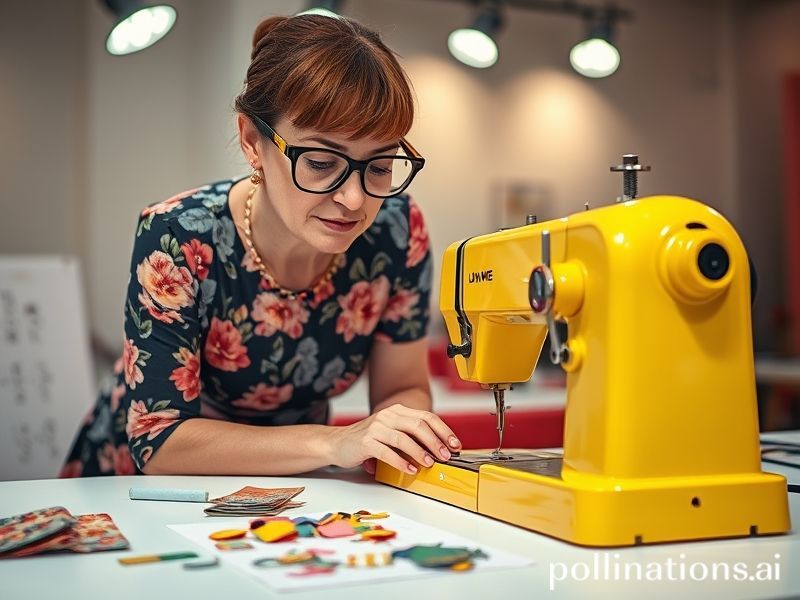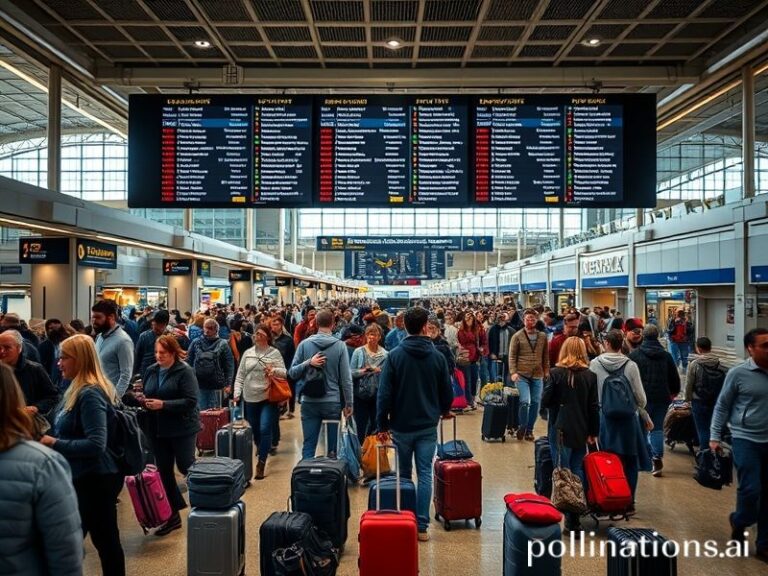Sophie Willan’s Sewing Bee: How a Bolton Comic Unpicked the Last Threads of Empire
Sophie Willan’s Sewing Bee and the End of Empires
By Dave’s Locker International Correspondent
PARIS—In a dimly lit arrondissement café where the espresso is priced like a Tokyo studio apartment, the television above the bar flickers to life with the unmistakable trill of BBC One. A baker from Bury is trying to sew a corset from a parachute while Sophie Willan—stand-up comic, BAFTA winner, and now self-appointed high priestess of haberdashery—cracks jokes about the Habsburgs. The French patrons look up, shrug Gallically, and return to arguing about pension reform. Yet somewhere between the rustle of calico and the clink of demitasse spoons, an empire quietly dies—not the French one, mind you; that perished ages ago—but the shared illusion that the global north still dictates what constitutes Important Culture™.
From Dakar to Detroit, the transmission ricochets across undersea cables older than most nation-states. In Lagos, fashion students stream the episode on cracked phones, taking notes on how to upcycle Ankara off-cuts into haute couture. In Seoul, K-pop trainees pause their choreography drills to debate whether Sophie’s bias binding technique could be monetised as NFTs. Meanwhile, in Moscow, a sanctioned oligarch’s daughter binge-watches on a VPN, wondering if embroidery might be the next sanctioned luxury import. The sewing bee, once the gentle purview of church halls and WI meetings, has become a geopolitical Rorschach test: everyone sees their own unraveling hegemon stitched into the hem.
The show’s genius lies in its weaponised nostalgia. Sophie Willan, with her Bolton vowels and timing sharp enough to slice bias tape, repurposes the twee iconography of British domesticity into something almost subversive—like discovering your grandmother’s doilies were actually coded battle plans. Each contestant’s frock coat or 18th-century stays becomes a Trojan horse, smuggling post-industrial anxiety past the gates of prime-time entertainment. Viewers in Buenos Aires recognise the maneuver: it’s the same alchemy Peronists once used with tango, turning folk dance into soft power. Except now the gauchos are using gusset insertion tutorials.
International development economists, ever eager to ruin a party, have noted that global thread consumption spiked 4.7 % during last season’s finale. Fast-fashion giants in Bangladesh reported a brief but measurable dip in orders as viewers contemplated visible mending. The World Bank, never one to let a moral panic go unfunded, is drafting a white paper titled “The Great British Stitch-Up: Craft Soft Power and Supply Chain Displacement.” Somewhere in Geneva, a delegate is Googling “how to pronounce gusset” in six official languages.
Back in Blighty, tabloids fret that Sophie’s jokes about Prince Andrew’s “thread count” constitute treason. Royal correspondents—those last lonely sentinels of deference—warn of a “sew-cialist coup.” But the outrage is performative, a kind of ritual harrumphing that serves the same function as a poplin interfacing: invisible yet structurally essential. Without it, the whole garment of monarchy might simply sag.
And sag it does, metaphorically speaking. Each perfectly timed punchline is another stitch popped in the corset of imperial self-regard. The Commonwealth, already held together by little more than shared fondness for cricket and subsidised whisky, watches with the queasy recognition that the mother country has turned its heritage into handicraft cosplay. Even the Union Jack cushions—knocked up in a two-hour challenge using only remnants from a defunct department store—feel like a taunt: we sold you empire, now we’re selling you the off-cuts.
Yet there is hope, of the gallows variety. In Kyiv, volunteers run sewing circles to make flak-jacket covers, inspired by Sophie’s tutorials on French seams. In Tijuana, migrants repurpose donated fabric into Quinceañera gowns, whispering that if the Bee can turn parachutes into prom dresses, maybe borders can be unstitched too. Every needle is both sword and ploughshare; every bobbin, a tiny revolution.
As the credits roll, Sophie winks at the camera, reminding us that “history is just embroidery with better PR.” Somewhere, a historian drops her monocle into her Earl Grey. The empire ends not with a bang, but with a backstitch.







